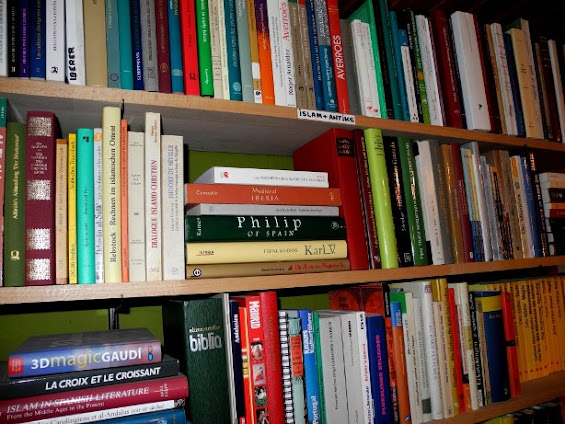Die multikulturelle und multireligiöse Situation auf der Iberischen Halbinsel des Mittelalters ist ausgesprochen variantenreich, dialogisch und spannungsgeladen gleichermaßen. Intensive Forschungen haben eine ausführliche Literatur hervorgebracht.
Sie beschäftigt sich neben Überblicksdarstellungen mit jeweiligen Schwerpunkten zum Miteinander und Gegeneinander der drei großen monotheistischen Religionen, politischer Interessen, sozialer und ethnischer Konflikte.
-
David Thomas (ed.): The Bloomsbury Reader
in Christian-Muslim Relations,
600-1500.
London et alii: Bloomsbury Publishings
2022, 352 pp., index - Focus Iberische Halbinsel:
Dialog & Auseinandersetzung - eHumanista. Journal of Iberian Studies.
Ed.: Department of Spanish and Portuguese
University of California Santa BarbaraSanta Barbara, CA 93106

- Sarazenen-wiki –
Ein Wiki zu Saraceni, Mauri, Agareni, …
in lateinisch-christlichen Quellen des 7. bis 11. Jh.s –
Repertorium Saracenorum -
Mediävistische Perspektiven –
Universitätsverlag Göttingen 2016, 397 S.
- Brian A. Catlos: al-Andalus. Die Geschichte des islamischen Spanien.
München: C.H. Beck 2019, 497 S., Abb., Karten
— Verlagsinfo, Inhaltsverzeichnis und Leseprobe >>>
— Rezension von Andreas Kilb in FAZ online, 07.07.2020

- Michel Clévenot:
Episoden aus Geschichte des Christentums, 9.-13. Jahrhundert - Philosophie und Religion – von der Antike bis zur Gegenwart
- Islam in Italien – Schwerpunkt Sizilien
-
-
71 Liverpool University Press (UK) 2019, 440 pp.
Eulogius, Alavaro und die Märtyrer von Córdoba –
Christen im islamischen Spanien des 9. Jahrhundert - Im Blickfeld: Averroes und Averroismus –
Erkenntnis im Horizont der Transzendenz - Die Iberische Halbinsel nach 1492 unter christlicher Herrschaft:
Mudejaren und Morisken - Mustapha Adila (ed.): Mudéjares y Moriscos
en las fuentes textuales y documentales.
Actualidad de su memoria histórica,
Homenaje
a Mª Jesús Viguera Molins
Tetuan (Maroc):
Publicaciones de la Asociación Marroquí
de Estudios Andalusíes, 2017), 492pp.
Bericht in: Hespéris-Tamuda LII (2) (2017): 363-369 - Intellectual History of the Islamicate World.
Journal Print & Online (Leiden: Brill) – Online-Zugriff auf die Abstracts - Jüdische und islamische Philosophie im Mittelalter: hier
- Ferner: Aspekte zum Islam in Europa: hier
- Die Geburt der modernen Wissenschaft
(Bildergalerie)

ÎDRÎSi.
La Première Géographie de l’Occident.
Présentation, notes, index,
chronologie et
bibliographie par
Henri BRES et Anneliese NEF.
Traduction du chevalier JAUBERT
Paris: Flammarion 1999(nach Qantara.de, 22.12.2017)
- Tarek Khaloui: Creating the Mediterranean.
Maps und the Islamic Imagination.
Leiden: Brill 2017
Ergänzende und erweiterte Literatur-Zusammenstellung
Fukuzo AMABE: Urban Autonomy in Medieval Islam – Damascus, Aleppo, Cordoba, Toledo, Valencia and Tunis. Leiden (NL): Brill 2016, 202 pp., illustr., 4 maps ——-
The Middle East was the first
region to develop cities and then empires in ancient times. Furthermore,
the Islamic world was the first to transform ancient political or
farmer cities to economic and industrial ones …
region to develop cities and then empires in ancient times. Furthermore,
the Islamic world was the first to transform ancient political or
farmer cities to economic and industrial ones …
1. Baghdad: An early abortive Example
2. Damascus during the later 10th century
3. Aleppo during the eleventh to early 12th centuries
4. Córdoba during the early decades
of the eleventh century
5. Toledo during the 11th century
6. Valencia during the later 11th century
7. Tunis during the eleventh to twelfth centuries
7. Tunis during the eleventh to twelfth centuries
- Literatur von und über MAIMONIDES – noch mehr zu
Maimonides >>>
- Roger Arnaldez: A la croisée des trois monothéismes.
Une communauté de pensée au Moyen-Age.— Paris: Albin Michel 1993, 447 pp., index
Amar S. Baadj: Saladin, the Almohads and the Banū Ghāniya.
The Contest of North Africa (12th and 13th centuries)
Serie: Studies in the History and Society of the Maghrib,
Band: 7Leiden: Brill 2015, 250 pp., illustr., maps
Buchvorstellung: hier
- Abdurrahman Badawi: La transmission de la philosophie grecque
au monde arabe. Études de Philosophie Médiévale LVI — Paris: J. Vrin 1987,
2ème éditom, revue et augmentée, 213 pp. - Nicola Becker / Eva Hamer (Red.):

Cover: Szenen aus dem Leben
des Hl. Bonifatius
(Fuldaer Sakramentar um 975)Mönchtum – Kirche Herrschaft. 750 – 1000
Sigmaringen: Thorbecke 1998, 359 S., Register- L. Benavides Barajas: Al-Andalus.
El cristianismo,
mozárabes y muládies. Dulcinea 1995, 119 pp., illustraciones
- Christoph Bürgel (Fabian Käs, Hg.):
- Ärztliches Leben und Denken
im arabischen Mittelalter.
Leiden (NL): Brill 2016, 510 pp. -
Furchtbare Epidemien – Zwischen Pest und Cholera —— Terribles épidémies – Entre la pest et le choléra
(Charlotte Chaulin, Herodote.net, 29.02.2020) -
Pandemien im Mittelalter
und in der Neuzeit:
Nachdenken angesichts eines sich ausbreitenden Virus
(Dialog-Journal, März 2020
-

-
Alvaro Campaner y Fuertes: La Dominación Islamita en las Islas Baleares.
— Prológo de G. Rossello Bordoy — Informe crítico: Francisco Codera y Zaidin.
Palma de Mallorca: Govern Balear / Miquel Font 1989, 2. Aufl., 327 S.
(ausführliches Inhaltsverzeichnis) -
Louis Cardillac (dir.): Tolède, XIIe – XIIIe. Musulman,
- chrétiens et juifs:
Le savoir et la tolérance.
Paris: Autrement – Série Mémoires, no. 5, 991, 277 pp., annexes - Anwar G. Chejne: Historia de Espana Musulmana.
Madrid: Catedra 1993, 432 pp., índice - Jessica A. Coope: The Martyrs of Córdoba. Community and Family Conflict
in an Age of Mass Conversion.
Lincoln (USA)/ London: University of Nebraska Press 1995, XIV, 113 pp., index
Frank R. Trombley: Inhaltliche Zusammenfassung, in:
Journal of Early Christian Studies, Volume 4, Number 4, Winter 1996, pp. 581-582 -
Ana Echevarría Arsuaga /
Dorothea Weltecke (Hg.):
Religious Plurality
and Interreligious Contacts
in the Middle Ages.
Wiesbaden: Harrssowitz 2020,
224 pp. 1 illustr., tables –
Wolfenbütteler Forschungen Bd. 161 -
- Ana Echevarría / Bernd Jaspert:
Machtausübung spanischer Köngininnen im Mittelalter
— In: Anuario de Estudios Medievales , 46/1 (2016) — academia.edu — - Ana Echevarria — The City of the three Mosques:
Ávila and its Muslims in the Middle Ages (academia.edu)
- Ana Echevarría / Bernd Jaspert:
- David Peláez Portales:
La Administración de Justicia en la Espana musulmana.
Córdoba: El Almendro 1999, 127 pp. - James M. Powell (ed.): Muslims under
- Latin Rule. 1100 – 1300.
Princeton University Press 1990, 221 pp., index - María Roso Menocal: L’Andalouse arabe. Une culture de la tolérance.
VIIIe – XVe siècle.
Collection Mémoires, no. 92. Paris: Éditions Autrement 2003, 247 pp.
— Rezension in: La Cliothèque, 06.09.2003 - Flocel Sabaté (ed.): The Crown of Aragon.
A Singular Mediterranean Empire.Brill’s Companions to European History , Volume 12 , Leiden (NL): Brill 2917, 608 pp., illustr.
- Diego R. Sarrió Cucarella: Muslim-Christian Polemics
across the Mediterranean.
The Splendid Replies of Shihāb al-Dīn al-Qarāfī (d. 684/1285). — Leiden: Brill 2015, XII, 368 pp.
Verlagshinweise: hier - Philippe Sénac: Charlemagne et Mahomet en Espagne
(VIIIe – IXe siècles) –— Collection „Folio Histoire“. Paris Gallimard 2015, 437 p. - Juan José Tamayo: Hermano islam [Bruder Islam]
Madrid: Trotta 2019, 128 pp.
Rezension >>> - TUCOO-CHALA,
Pierre: Quand l’Islam était aux portes des Pyrénées.
De Gaston IV le croisé à
la croisade des Albigeois (XIe – XIIIe siècles).
Biarritz (Frankreich): J &
D Editions 1994, 285 S., Abb. Karten
- Abdel Magid Turki: Théologiens et juristes de l’Espagne musulmane – aspects polémiques. Islam d’hier et auhoud’hui, Bd. 16.
— Paris: Maisonneuve & Larose 1982, 373 S.
- Dominique Urvoy: Penseurs d’Al-Andalus. La vie intellectuelle a Cordove et Seville
au temps des empires berbers (Fin Xie siècle – début XIIIe siècle).Paris: CNRS / Presses Universitaires du Mirail
1990, 212 S., index des auteurs - Dominique Urvoy: Les
penseurs libres dans l’islam classique. L’interrogation sur la religion chez les
penseurs arabes indépendants. Paris: A. Michel 1996 . –
Taschenbuchausgabe bei Champs /
Flammarion, TB 528, 2002. - Monika Walter: Der verschwundene Islam?
Für eine andere Kulturgeschichte Westeuropas.
Paderborn: W. Fink 2016, 533 S., Autorenverzeichnis
Besprechung in Deutschlandradio Kultur — (09.11.2016)— Ausführliche Rezension: hier






